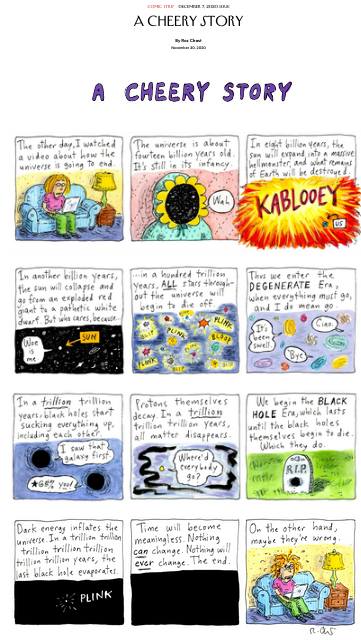Last weekend, there was an engrossing article in the New York Times.
Titled, ‘A Frankenstein’ that Never Lived, the piece’s top-line summary runs, “On Jan. 4, 1981, the effects-heavy production opened and closed on the same night. Forty years later, the creators revisit a very expensive Broadway flop.”
According to the article, prior to the open, hopes for success of the big-budget enactment of Mary Shelley’s 1818 classic had run high, but the show’s prospects were dashed in large and immediate measure by Frank Rich’s dreadful review in the Times. Rich’s write-up brims with both arch sarcasm and gut-punch lines such as, “we feel nothing except the disappointment that comes from witnessing an evening of misspent energy.” Reading the article, I can feel a queasy, visceral sympathy for everyone who worked on that production.
At the end of the last century, Fred Adams and I were riding high on our forecasts for the denouement of the entire cosmos. Our trade book — The Five Ages of the Universe — had, to our great thrill, just been published by an imprint of Simon and Schuster, and we were enjoying the modest acclaim that had proceeded from dividing the entire past and the entire future of the Universe into five thumbnail-friendly eras of time.
The sales, the buzz, and the idle dreams of pop-culture stardom all came to a crashing halt from one day to the next when the New York Times ran its review of our book. I can recall the sinking feeling at the moment when our agent called Fred to let us know what had happened. “Brace yourself.” I think that was what she said.
Dick Teresi’s review was entitled, “The First Squillion Years”, and the title telegraphed the intent. It starts out bad, it gets progressively worse, and finally ends rather crushingly, with “Imagine an astronomer looking back at us ages hence. Perhaps he can read the bound galleys in my hand. Maybe he will be kinder than I have been here.” Yikes.
It’s amazing, however, how quickly one recalibrates. The book tour that had been in the cards was scaled way back to a handful of local appearances, with Borders Books in Ann Arbor standing in as the high point. Sales dried up. Just like that, I was back to trying to find bugs in Fortran codes. Over time, it became clear to me that it was almost certainly just as well.
Rather amusingly, the distant future is currently having something of a moment. There have been several new trade books on the topic, including at least one that got a review in the Times that was entirely different in tone that the one we drew. And then, a fantastic coda for the whole episode arrived unexpectedly a week or two ago as I was leafing through a recent issue of the New Yorker.
I’ve always enjoyed Roz Chast’s cartoons. She has a great sense of humor. It was oddly gratifying to see that she’d somehow been seized to lift out our eras and our thumbnails, elevating them to a full-page cartoon.

